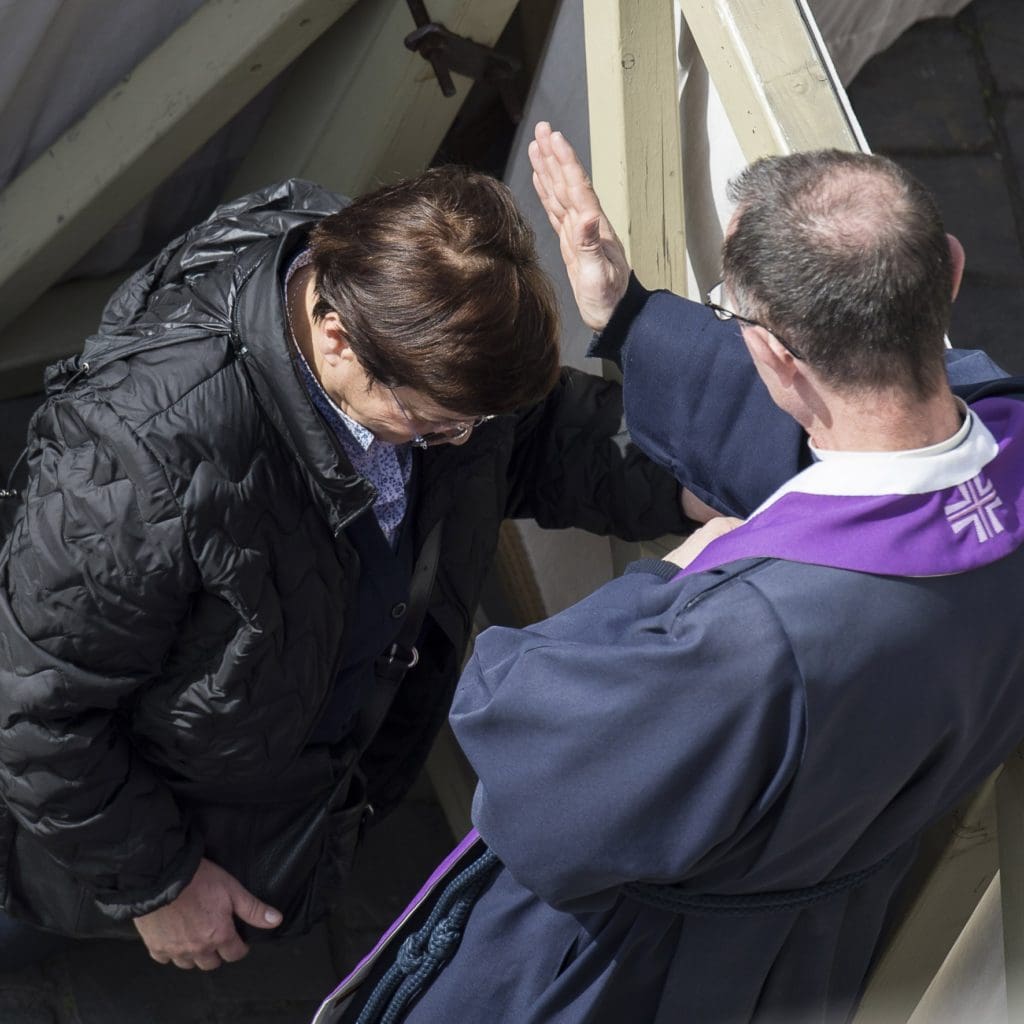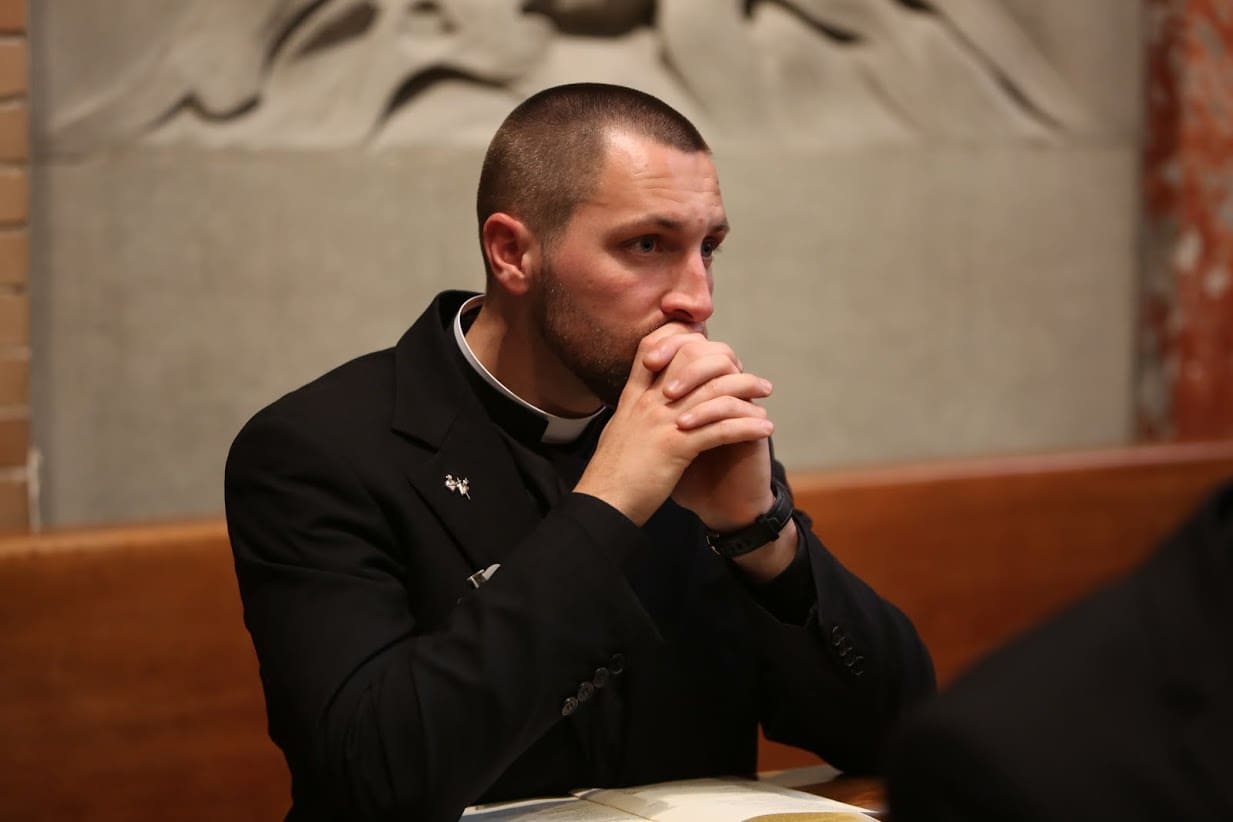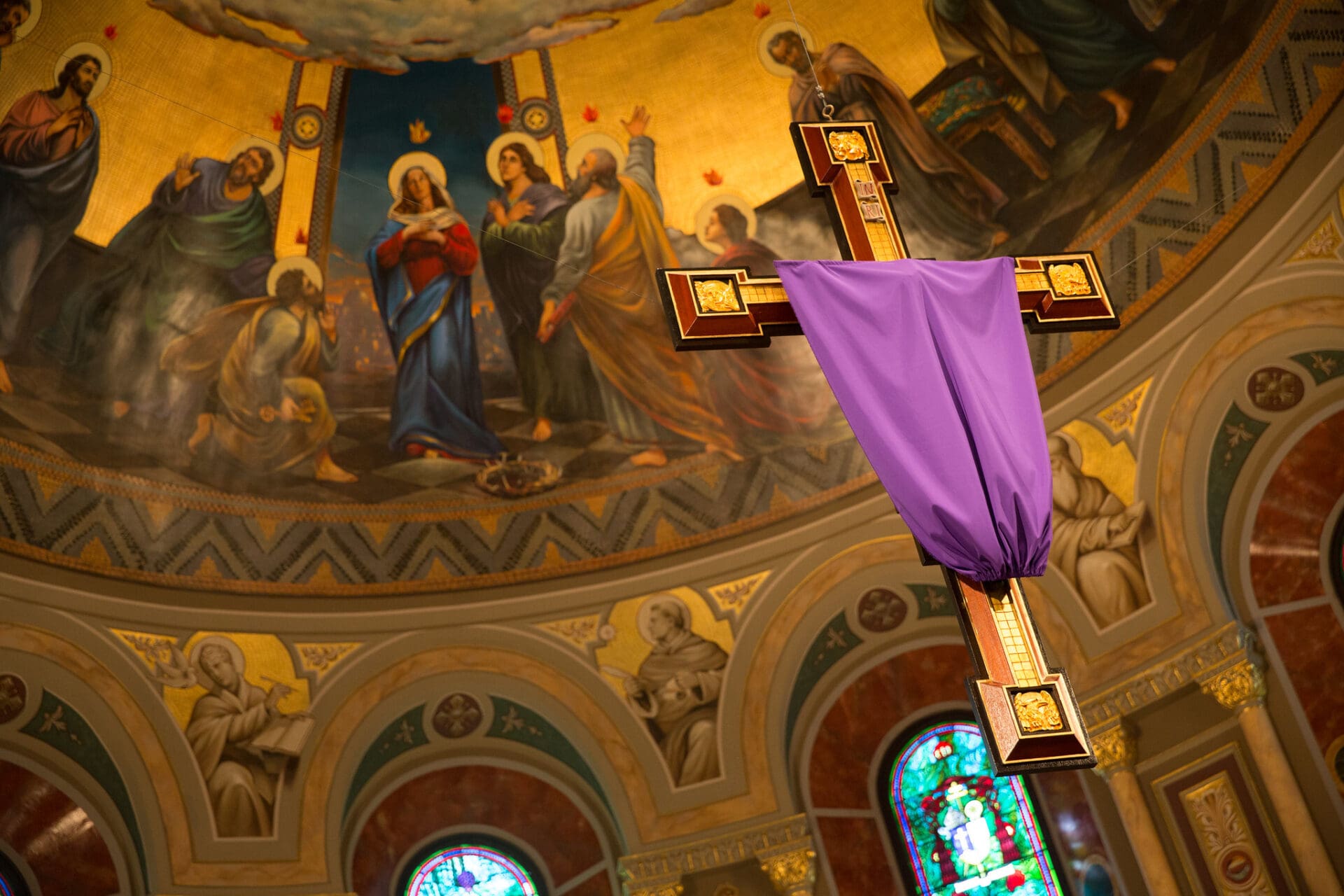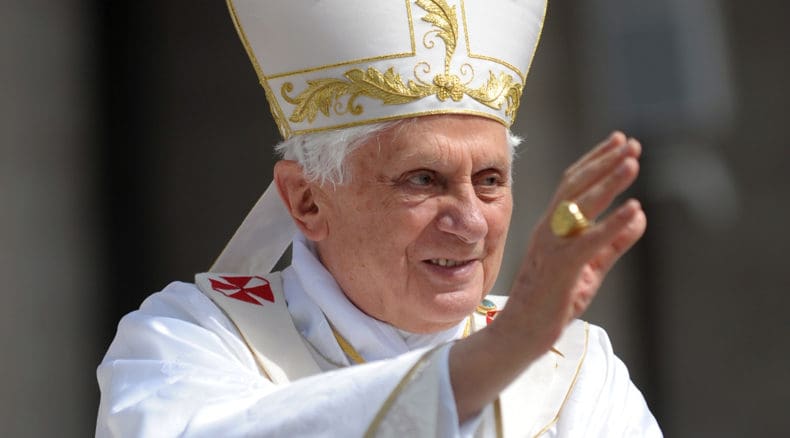Lay Catholics who frequent the Sacrament of Confession know what its reception requires of them: From the moment they examine their conscience to the moment they leave the confessional to complete their assigned penance, their role is clear. But what about the priest who administers the sacrament? Both his training as a confessor and his experience in the confessional may remain somewhat mysterious, at least to the average layman, since a confessor is understandably reluctant to speak about these sacred matters lest he violate the sacramental seal and incur the grave penalties such a violation entails. The fact remains, however, that the priest arrives at the confessional only after a long journey. The Church, through her seminaries, places a premium on educating excellent confessors. The present article offers a glimpse of this preparation: What is it like for a seminarian to learn the ministry of the confessor during his seminary training?
As we will see below, seminarians often express apprehension about their ability to live up to the demands of the sacrament, yet they remain undeterred in their joyful aspiration to imitate great priest-confessors like St. John Vianney. Both their apprehension and their aspiration, which reflect a genuine appreciation for this sacrament and a love of Jesus Christ, are reasons for the Church to be optimistic about the future priests who will guide the faithful in the years to come.
Formed to Forgive
All seminarians take a variety of moral theology courses during their seminary formation. Topics include, but are not limited to, action theory (the study of human acts and when they are sinful), theological anthropology (for example, St. John Paul II’s theology of the body), sin, virtues and vices, marriage and family life, states of life (lay, consecrated, ordained), human sexuality, and Catholic social doctrine. Such courses typically focus on fundamentals and theory, but good professors will pepper their lectures with concrete, topical examples to help solidify their students’ grasp of the Catholic moral tradition. All seminarians must also take at least a year’s worth of canon law. It is here that seminarians learn the Church’s legislative discipline concerning the minister and recipient of the Sacrament of Confession, the norms for administering the sacrament, faculties to hear confessions, reserved cases (sins that the Holy Father or local bishop has reserved to himself to forgive, such as apostasy, heresy, schism, violating the sacred species of the Eucharist, or attacking the pope), and indulgences. Some seminaries offer courses on pastoral counseling and psychology to present a more complete picture of the human person. Such courses also give seminarians an understanding of mental illness and teach them how to work with psychiatric and psychological professionals to help the penitent fully heal.
What is it like for a seminarian to learn the ministry of the confessor during his seminary training?
Toward the end of their formation, seminarians in the United States take a semester-long course that synthesizes the above-mentioned courses in view of the Sacrament of Penance. This course addresses topics proper to the sacrament itself, such as its scriptural and anthropological foundations, its historical development, its nature and components (contrition, confession, satisfaction, absolution), while also dealing with other matters such as the sacramental seal and the celebration of the rite itself. Seminarians also learn how to handle pastorally reserved sins (sins that a priest cannot absolve because they are reserved to the pope or local bishop), censures (a punishment meant to have a medicinal effect in helping the person repent, like an excommunication), and special cases involving lack of a shared language between penitent and priest, penitents with disabilities, and so forth. This penance course has a decidedly practical dimension. For example, a typical assignment is to recite from memory the priest’s formula of absolution. If they do not do so in a separate practicum, seminarians will also practice hearing mock confessions in a classroom environment with one or more priests monitoring them and offering feedback. Other seminarians are often called in to play the part of a certain type of penitent, thus giving the “seminarian-confessor” an opportunity to envision himself dispensing mercy to all God’s people and to develop strategies suited to different kinds of penitents and to his own personality. Seminarians often find the first few practice confessions a bit jarring given that it is not an ordinary experience to have other people admit their sins. Having classmates “listening in” to the mock confession and his response only adds to the pressure the seminarian feels. Seminarians also react to this practicum by appreciating how quickly a good confessor listens to the penitent, synthesizes his own thoughts, and then speaks Christ-like words of mercy that truly address the penitent’s spiritual maladies.

Jesus in the Box
Given that seminarians usually take this course just before priestly ordination, it tends to increase their appreciation of the weighty responsibility incumbent on God’s minister of reconciliation. It’s not surprising, then, that a plethora of questions arise in this context. These questions both reflect the men’s apprehension about their future role as confessors and reveal the positive reasons motivating their aspiration to embrace it.
Even with all the preparation that seminarians receive at seminary, nothing compares to actual experience in the confessional. Seminarians sense this. This is why they often ask for advice about hearing their first confession. They know that of him to whom much is given, much will be required. While the first-time penitent may be nervous, the anxiety level of the priest hearing his first confession is certainly much higher!
Seminarians recognize the seriousness of the sacrament in which a penitent reveals the secrets of his soul. At the same time, they manifest a genuine desire to be Jesus for each and every penitent who approaches them. They are eager to “have the right word,” to know exactly what to say to help the penitent convert from sin to virtue; they wish to make the sacramental experience and the moment of grace memorable for the penitent. Given that no one does it better than Jesus, and that his standard is very high, seminarians initially fear falling short of the Master and disappointing him. This apprehension forces them to humble themselves and to face the reality that, if they wish to be Jesus Christ to the flock entrusted to their care, especially in the Sacrament of Confession, they must know him intimately. By knowing Jesus through a deep study of Sacred Scripture, countless hours spent in silent prayer, and meditation on the content of their seminary courses, these future confessors put on the mind of Christ so as to think, speak, and act like him. St. Paul’s words: “It is not I who live, but Christ who lives in me” take on a new and deeper meaning for those seminarians preparing to hear confessions.
While the first-time penitent may be nervous, the anxiety level of the priest hearing his first confession is certainly much higher!
God and Man in Confession
The prayer of the seminarian thus comes to include an ever more fervent petition: “Abide in me, Lord.” Yet his fear begins to subside once he recognizes that he will not hear confessions on his own authority or speak in his own name. Rather, Christ is with him, and he uses the powerful words of Jesus to convert hearts, heal wounds, and forgive sins in his name.
Seminarians often compare the content of their courses, as well as the practical suggestions of their seminary professors, to their own experience. They know from their own confessions that not every priest enables the penitent to feel that he has encountered Christ in the sacrament, and they do not wish to subject their own future penitents to the same experience. To direct this holy desire to a fruitful end, seminary professors will encourage seminarians to take a step back from any unfortunate personal experiences in the confessional and to imitate instead those priest-confessors who have visibly acted in persona Christi for them. In this context, seminarians often cite characteristics important to them in a confessor: One hears adjectives such as attentive, calm, listening, supportive, encouraging, positive, uplifting, hopeful, and helpful. It may sound simple, but the Golden Rule applies to the priest in the confessional as much as it does to anyone else. As Francis Cardinal Arinze once exhorted seminarians: “Hear someone’s confession the way you would want your confession heard.”
Time to Heal
Seminarians, like all penitents, know what it’s like to wait in long confessional lines. They are therefore understandably concerned about the question of time: They’re worried lest they spend too much of it on each penitent, which only lengthens the wait for those still in line, but they also realize that excessive briskness can leave the penitent with the impression of having been short-changed. The truth is that finding the balance comes with experience. (Yet even before hearing their first confession, seminarians do understand that some penitents may require more time to receive the healing graces of the sacrament to the full; they know that a few extra minutes may be crucial for healing a soul of some spiritual malady.) In the end, only the penitent, priest, and God know why one penitent’s confession runs longer or shorter than another’s.
“Hear someone’s confession the way you would want your confession heard.”
–Francis Cardinal Arinze
Seminarians also commonly ask for advice about what to do if there is still a line for confession when Mass is about to begin or the priest needs to use the restroom. The opposite question also tends to arise in seminarians’ minds: What should a priest do if no one comes to confession? Does he just sit there? How does a priest hear the confession of someone who has asked for the sacrament while in a store or at the airport?
Seminarians also typically ask for guidance in guarding against violation of the sacrament seal. Given that a priest who reveals a penitent’s sin incurs an automatic excommunication, this concern is quite understandable. While it may appear easy to refrain from disclosing the content of a confession, seminarians realize that more subtle issues arise. For example, they ask for tips about answering someone who says: “Don’t you remember, Father? I told you yesterday in confession.” Another common question concerns how to maintain a neutral expression or, better, how to “act normal” in the presence of a person whose confession one has just heard. Further, while priests pray for the grace to forget confessions, what if there is one they cannot forget? And what should a priest do if a person known to him, say a church employee, mentions in confession that he has stolen from the parish (or worse)?
Seminarians are inspired to be great confessors by the stories of confessor-saints like John Vianney and Padre Pio.
Personal Work
Seminarians share many other experiences and concerns in the course of their preparation for the confessor’s role. For example, many of them are introverts who nonetheless wish to help other people. Confession offers a safe place for such introverts to shine and to mediate spiritual healing to others. Furthermore, seminarians bring to the classroom their own knowledge of what it means to say that Jesus saves in the sacrament: They themselves may have had a positive personal experience of radical conversion in the context of confession, or else they will know others whose lives have totally changed through reconciliation with God. Seminarians also often express their confident hope that loved ones who confessed shortly before death will go to heaven. The peace that they have about the eternal destiny of these loved ones is a gift they desire to share with everyone.

Seminarians are inspired to be great confessors by the stories of confessor-saints like John Vianney and Padre Pio. Since the priesthood channels the love of the Sacred Heart of Jesus, seminarians take seriously Our Lord’s request to St. Margaret Mary Alacoque that we make reparation for sins. This devotion, together with Our Lady of Fatima’s call to do penance for sinners, places the importance of sacramental confession before the seminarian’s mind. Closer to our own time, St. John Paul II’s pontificate of mercy highlighted the importance of the Sacrament of Confession, and we are still reaping abundant fruit from the seeds he planted. Thus, seminarians will often cite a celebration of Divine Mercy Sunday as a pivotal moment in their vocational discernment. Many seminarians have a profound devotion to Jesus’ Divine Mercy and pray the Chaplet of Divine Mercy on a daily basis. As their devotion to Jesus’ Divine Mercy continues to grow during their seminary years, the experience wells up in their hearts an ever-greater desire to be the instrument through which Our Lord dispenses that mercy. They know what it means to pray “Jesus, I trust in You,” and they want others to pray it with them.
Men of Mercy
The Church and her lay members ought to be optimistic about the future. First and foremost, despite all the scandals and controversies in recent decades, men keep showing up at seminaries. Further, these men are frequent recipients of the Sacrament of Confession who are intimately acquainted with its power. As such, they will become a generation of priests who receive, preach, and offer the sacrament.
Because of the devotion to the Sacrament of Confession these future priests manifest even now, we can be confident that they will be zealous and generous ministers of reconciliation who will do much more than the bare minimum of half an hour on Saturday afternoons. Knowing personally that the world needs the mercy of Jesus Christ, they are ready to make themselves unstintingly available to bring it to their fellow men.
Father Anthony J. Stoeppel, a priest of the Diocese of Tyler, TX, serves as Vice-Rector of St. Patrick’s Seminary & University in the Archdiocese of San Francisco.
Image Source: AB/Catholic News Agency


